
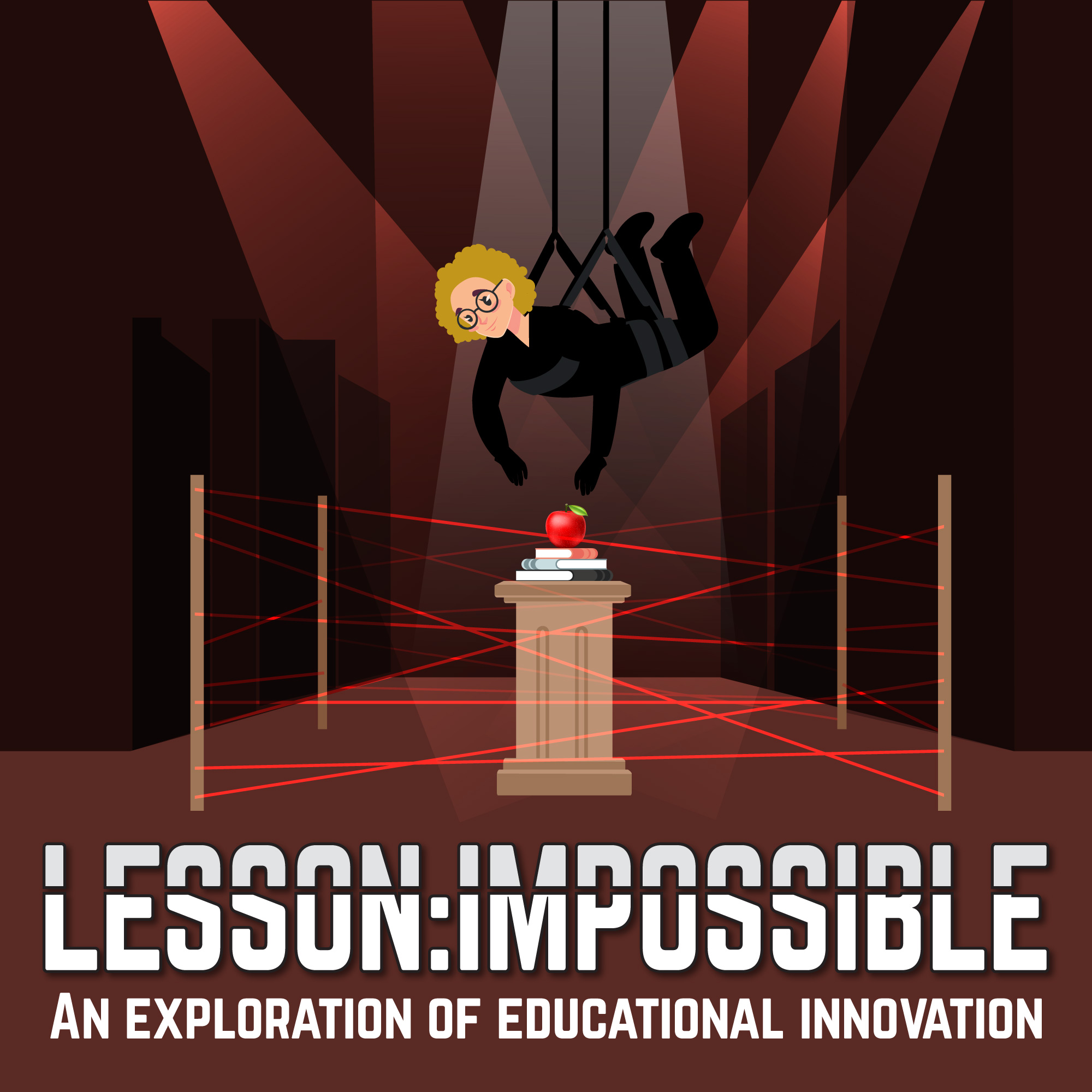
Your lesson, should you choose to accept it, is to listen to interviews with educators who are on the forefront of innovative pedagogy, with your host Aviva Levin. Check out www.lesssonimpossible.com for podcast info and blog.
Your lesson, should you choose to accept it, is to listen to interviews with educators who are on the forefront of innovative pedagogy, with your host Aviva Levin. Check out www.lesssonimpossible.com for podcast info and blog.
Episodes
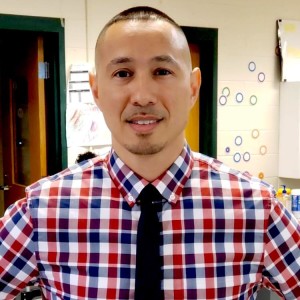
Sunday May 31, 2020
Agent Jorge Valenzuela (Computational Thinking)
Sunday May 31, 2020
Sunday May 31, 2020
Your lesson, should you choose to accept it, is to incorporate computational thinking into all content areas. The special agent assigned to help you with this task is Jorge Valenzuela, of Lifelong Learning Defined, in Virginia.
In this episode we discuss:
- Jorge’s path to becoming a teacher
- Four elements of computational thinking: decomposition, abstraction, pattern recognition, algorithm design
- Work shopping how I could apply computational thinking to French
- Jorge’s perspective on including STEM into all subjects
- His favorite unit or lesson
- How Jorge’s personal pedagogical philosophy has evolved over time
- Why he thinks PBL is the best PD teachers can do
- Jorge’s success in improving his writing and his advice on how to do the same: write about something you’re good at, find a mentor, put in the time
- His struggle with emotional intelligence
- How STEM is becoming more inclusive for students
- Jorge’s hatred of buzzwords
- His ideal school system
Find out more about Jorge:
- Jorge's bio
- Jorge's Blog
- Jorge’s Twitter
- Jorge’s Instagram
- Jorge’s Facebook
Resources mentioned:
- Jorge’s book Rev Up Robotics (You can read the chapter on Computational Thinking for free)
- International Society for Technology Education
- PBL Works
- Park Based Learning with James Fester
- Jorge’s inspiration: Andrew Miller
- Emotional Intelligence 2.0 by Travis Bradbury and Jean Greaves
- Christine Primomo on the gender divide in STEM
- The Every Student Succeeds Act
If you want to find out more about what innovative educators are doing around the world, check out www.lessonimpossible.com. And if you like the podcast, please consider rating, reviewing and subscribing or forwarding it to a colleague. You can also follow Lesson: Impossible on Twitter, Facebook and Instagram.
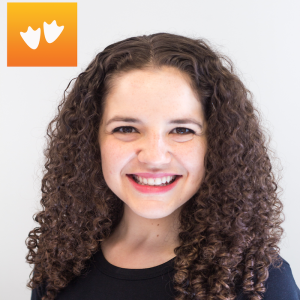
Wednesday May 27, 2020
MINI MEET A RESOURCE: Rebecca Yaffa of GooseChase
Wednesday May 27, 2020
Wednesday May 27, 2020
Your lesson, should you choose to accept it, is to consider a new resource: GooseChase, an app for creating scavenger hunts. The resource specialist assigned to help you with this task is Rebecca Yaffa, Director of Customer Experience, from Toronto, Canada.
This is the third installment in the ‘Meet the Resources’ series, where I feature the educational equivalent of Gecko Gloves, Smart Contacts, or Flute Guns: technology that has been created to make your impossible lessons actually possible! A reminder that Lesson: Impossible receives no compensation for featuring resources, just the satisfaction of knowing that somewhere a student might be more engaged in their learning or a teacher might be able to leave work a little bit earlier.
In this episode, Aviva and Rebecca touch on a variety of topics including:
- Who uses GooseChase EDU? (Hint: It's not just teachers!)
- How GooseChase EDU makes scavenger hunts easy and automated for educators
- How organizers can get started by using missions from the The Game Library.
- How educators utilized GooseChase for Virtual Learning during the social isolation period.
- GooseChase EDU availability for school and district-wide plans.
- How GooseChase handles personal data created on the platform.
- How Rebecca got involved with GooseChase and working as part of a fully-remote team.
- How K-12 teachers can take advantage of complimentary upgrades to Educator Plus until September 1st.
Links:
If you want to find out more about what innovative educators are doing around the world, check out www.lessonimpossible.com. And if you like the podcast, please consider rating, reviewing and subscribing or forwarding it to a colleague. You can also follow Lesson: Impossible on Twitter, Facebook and Instagram.
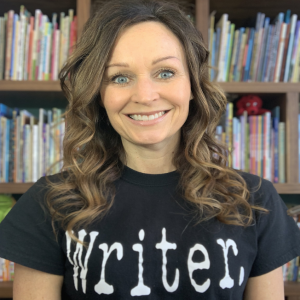
Sunday May 24, 2020
Agent Shannon Anderson (Writing)
Sunday May 24, 2020
Sunday May 24, 2020
Your lesson, should you choose to accept it, is to help students enjoy writing as they discover how to improve their written work. The special agent assigned to help you with this task is Shannon Anderson of Rensselaer, Indiana.
A transcript is available for this episode.
I’ve really enjoyed the last few weeks of episodes that were looking at some resources and grappling with some big philosophical questions about teaching: what is my teacher identity? How can I infuse meaning into my curriculum? Is there a way to prevent teacher burnout? However, today’s episode has us focusing again on something very concrete, but incredibly important: how can I teach writing? As I, and you, my wonderful listeners, will soon discover, it’s easily done at any grade, if you have the right mindset and strategies. Fortunately Shannon Anderson was willing to share some of her writing wisdom when we spoke at the end of April over zencastr.
In this episode we discuss:
- Why training students to become good writers is like training for a marathon.
- An example lesson for introducing narrative writing
- The biggest mistakes teachers make when teaching writing
- Four tips she gives students to become better writers
- Publishing student work and Budsies
Links:
- Shannon’s Twitter
- Shannon’s Facebook
- Shannon’s YouTube
- Shannon’s LinkedIn
- Shannon’s Pintrest
- Shannon’s Instagram
- Shannon’s Website
If you want to find out more about what innovative educators are doing around the world, check out www.lessonimpossible.com. And if you like the podcast, please consider rating, reviewing and subscribing or forwarding it to a colleague. You can also follow Lesson: Impossible on Twitter, Facebook and Instagram.
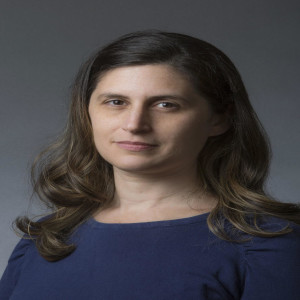
Sunday May 17, 2020
Agent Lauren Porosoff (Meaningful Curriculum)
Sunday May 17, 2020
Sunday May 17, 2020
Your lesson, should you choose to accept it, is to put students’ own values at the center of their learning in order to make school meaningful beyond academic skills. The special agent assigned to help you with this task is Lauren Porosoff of Scarsdale, New York.
A transcript is available for this episode.
In this episode we discuss:
- Parents advocating for meaningfulness
- The three kinds of relevance: personal, practical, cultural
- Her favorite meaningful units: A Midsummer Night’s Dream & spoken word poetry
- Addressing three criticisms of making curriculum meaningful: kids need to learn that not everything is about them, there’s no time to get to know students, and young people don’t know what is meaningful to them yet
- What to do if a teacher wants to change their curriculum
- Feeling lonely or disempowered while innovating
- ACT: Acceptance and Commitment Therapy
- Her decision to no longer teach Sherman Alexie’s Absolutely True Diary of A Part-Time Indian
- How to get in touch with Lauren
Links:
- Lauren’s Twitter, Facebook and Website
- Book: Two-for-One Teaching: Connecting Instruction to Student Values
- Book: Empower Your Students: Tools to Inspire a Meaningful School Experience
- Article: “A Midsummer Night’s Gender Diversity”
- Article: “Why I’ll Never Teach This Powerful Book Again”
- For more about ACT: The Association for Contextual Behavioral Science
If you want to find out more about what innovative educators are doing around the world, check out www.lessonimpossible.com. And if you like the podcast, please consider rating, reviewing and subscribing or forwarding it to a colleague. You can also follow Lesson: Impossible on Twitter, Facebook and Instagram.
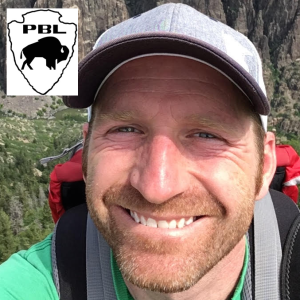
Wednesday May 13, 2020
MEET A RESOURCE: James Fester of Park Based Learning
Wednesday May 13, 2020
Wednesday May 13, 2020
MEET A RESOURCE: The Park Based Learning Project creates free lessons and resources using project based learning, and game based design, principles. They provide ready-to-use lessons and differentiated assessments, as well as opportunities to collaborate on specific local, state, or national park-based projects. The founder and leader of the Park Based Learning Project is James Fester who is also a teacher, consultant, author, and state and national park volunteer interpreter currently living in Minnesota.
A transcript is available for this episode.
Links:
- Parks Based Learning Website & Twitter
- Visit a National Park (virtually)
- Projects Gallery
- Structure of Parks Based Learning Experiences
- Hopewell Earthworks Project & Bears Ears Project
- Landmark Learning Project Handbook
- Article: “Engaging New and Diverse Audiences in the National Parks”
For more on what innovative educators are doing around the world, check out www.lessonimpossible.com, where you can also reach out with recommendations for new guests.
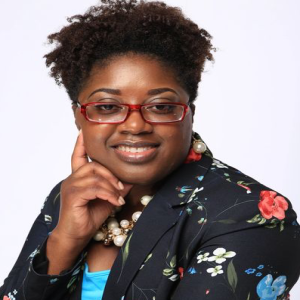
Sunday May 10, 2020
Agent Dr. Marquita Blades (Teacher Burnout)
Sunday May 10, 2020
Sunday May 10, 2020
Your lesson, should you choose to accept it, is to examine the factors contributing to, and find strategies to prevent or recover from, teacher burnout. The special agent assigned to help you with this task is Dr. Marquita Blades of Atlanta, Georgia.
In this episode we discuss:
- Marquita’s many educational projects
- Her path to becoming a teacher
- Her personal story of burning out
- How she defines ‘teacher burnout’
- The Mediocre Teacher Project
- How mental health impacts physical health
- The false narrative of teacher self-sacrifice
- Strategies to recover from a burn out
- How she thinks distance education will affect burn out
- How administrators can prevent burn out in their teachers
- How colleagues can help each other
- The Write Like a Gyrlfriend Scholarship
- Ways to contact Dr. Marquita Blades: her website, her Facebook, her Twitter, her Instagram
A transcript is available for this episode.
NOTE: Former guest/special agent, Charles Williams, has started his own education podcast! It’s called the Counter Narrative Podcast and its goal is “to challenge the dominant narrative surrounding our marginalized populations by highlighting the amazing work being done around the world by educators, students, and communities as they face daunting odds.” Dr. Marquita Blades also has a new podcast, Powarrful Teaching Strategies, where she recently interviewed another former guest of mine, Kwame Sarfo-Mensah, which just goes to show what a small world education can be!
If you want to find out more about what innovative educators are doing around the world, check out www.lessonimpossible.com. And if you like the podcast, please consider rating, reviewing and subscribing or forwarding it to a colleague. You can also follow Lesson: Impossible on Twitter, Facebook and Instagram.

Wednesday May 06, 2020
Agent Mandy Yom (ELL Kindergarten)
Wednesday May 06, 2020
Wednesday May 06, 2020
Your lesson, should you choose to accept it, is to create positive relationships with students and families in a kindergarten class for English Language Learners. The special agent assigned to help you with this task is Mandy Yom of Skokie, Illinois.
In this episode we discuss:
- A game to put yourself in the shoes of an English Language Learner (ELL)
- How a sheltered ELL kindergarten program works
- How students are selected into the program in Illinois
- Mandy’s path to teaching
- Building relationships with ELL families
- Learning the value of boundaries
- Striving to find ways to include data-driven feedback into her practice
- Needing to adapt the kindergarten curriculum for ELLs
- The various challenges of distance learning
- Non-traditional ways of communicating with families
- Her ideal school: getting families truly involved

Sunday May 03, 2020
Agent Evo Hannan (Design & Innovation)
Sunday May 03, 2020
Sunday May 03, 2020
Your lesson, should you choose to accept it, is to transform your passions for innovation and design into relevant assignments and global professional projects. The special agent assigned to help you with this task is Evo Hannan of Dwight School Dubai in the United Arab Emirates.
In this interview we discuss:
- His path to teaching design in Dubai
- How he stays relevant in his field
- What teaching design looks like
- Examples of student projects
- How he gets big companies involved in his projects
- Modeling being a designer and innovator for his students
- Making his projects and efforts transparent
- His live YouTube Ed Talks (next show is May 9 at 11am EST, 4pm GMT, 7pm GST)
- The Agency Project to promote student choice
- How Evo is able to stay passionate about teaching and avoid burnout
- His advice to new (and all) teachers
- His ideal school… that he’s currently developing in real life!
- Ways to get in contact: his website, Twitter, Instagram, YouTube
If you want to find out more about what innovative educators are doing around the world, check out www.lessonimpossible.com. And if you like the podcast, please consider rating, reviewing and subscribing or forwarding it to a colleague. You can also follow Lesson: Impossible on Twitter, Facebook and Instagram.
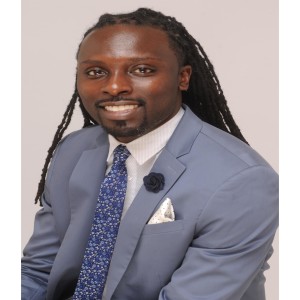
Friday May 01, 2020
BONUS EPISODE: Agent Kwame Sarfo-Mensah (Reflections on COVID-19)
Friday May 01, 2020
Friday May 01, 2020
Your bonus lesson, should you choose to accept it, is to explore how you think COVID-19 will change education. The special agent assigned to help you with this task is Kwame Sarfo-Mensah, owner and founder of Identity Talk Consulting.
I chose to air a bonus episode in addition to Kwame’s full-length interview about teacher identity for two reasons: one, I thought his insights were worth sharing, and two, I liked the idea of creating a record of how COVID-19 has been changing the ways teachers view education. I spoke with Charles Williams at the end of March about this issue for an entire episode, and then spoke with Kwame a little over a month later, though that month felt like it actually lasted several years. In that time, almost all districts have switched to a distance education model, especially for younger students, with mixed results.
Moreover, while some parents are seeing their children struggle with distance education or miss school keenly, other parents are seeing their children bloom in a situation where they don’t need to face the racism, homophobia, or ableism that they are forced to deal with daily.
Another important change is that larger issues of equity in education have been highlighted publically and sparked mainstream conversations about how learning opportunities are distributed. Many districts seem to be waking up to the fact that just because all students enter the same building every day does not mean that every one of them has equal access to technology, the Internet, and time to try and replicate the school experience at home, not to mention the 1.3 million American students who experience periods of unstable housing.
All of this to say, we are having more productive national and international conversations about education than I ever thought possible, and stake holders like parents are looking critically at our education systems now that many of its faults have been exposed. This is not to imply that there are not amazing teachers and districts that are doing wonderful things, and I do want to acknowledge their incredibly hard work. However, unless we’re willing to call out the places where we’re failing students, there’s no way we can change.
This excerpt from our conversation begins around at the 24-minute mark of episode twenty.
Links:
- Kwame’s website
- His books:
If you want to find out more about what innovative educators are doing around the world, check out www.lessonimpossible.com. And if you like the podcast, please consider rating, reviewing and subscribing or forwarding it to a colleague. You can also follow Lesson: Impossible on Twitter, Facebook and Instagram.

Wednesday Apr 29, 2020
MINI MEET A RESOURCE: Valerie Cerra of Lesson aLIVE
Wednesday Apr 29, 2020
Wednesday Apr 29, 2020
MEET A RESOURCE: Valerie Cerra, of Lesson aLIVE, a marketplace that connects educators and learners to experts and motivational speakers.
We discussed:
- Valerie’s background and her journey towards founding Lesson aLIVE
- How she finds her speakers
- Her most recent favorite presenter: Eva Pell
- How COVID19 has affected Lesson aLIVE, including adding relevant content via webinar
- The pricing model for speakers (including pro bono/grant options)
- How to contact her with new ideas and suggestions
NOTE: If this is the first episode of the podcast you are listening to, just a note that this episode is different than the rest. If you’re looking for interviews with educators about innovations in their practice, you can check out the most recent episode with Kwame Sarfo-Mensah, where we discuss teacher identity. However, if you’re interested in something new… give this episode a listen!
A little background: Occasionally I will get messages from businesses asking to come on the podcast. It has been my policy to say no (sorry Mensch on a Bench, aka the Jewish Elf on the shelf) but after some reflection, I realized that there are a lot of online educational resources out there, and it might make teachers’ lives a little bit easier during this pandemic if I were to highlight a few. Therefore, I’m starting a new series of bonus episodes that I’m calling “Meet the Resources” where educational product innovators can discuss the resource that they have created. To relate this to the Mission: Impossible theme, I am hoping to feature the educational equivalent of Gecko Gloves, Smart Contacts, or Flute Guns: technology that has been created to make your impossible lessons actually possible! I want to make it clear that I am not endorsing any products that I feature, though I’ll only cover them if I think they have merit for working teachings, nor am I receiving any compensation whatsoever.
Please feel free to share any feedback on whether or not I should continue with this bonus series, or if you have a suggestion for a resource I should reach out to, at aviva.levin@gmail.com.
You can find out more about what innovative educators around the world are doing at:
- Lesson: Impossible’s Website
- Lesson: Impossible’s Twitter
- Lesson: Impossible’s Instagram
- Lesson: Impossible’s Facebook